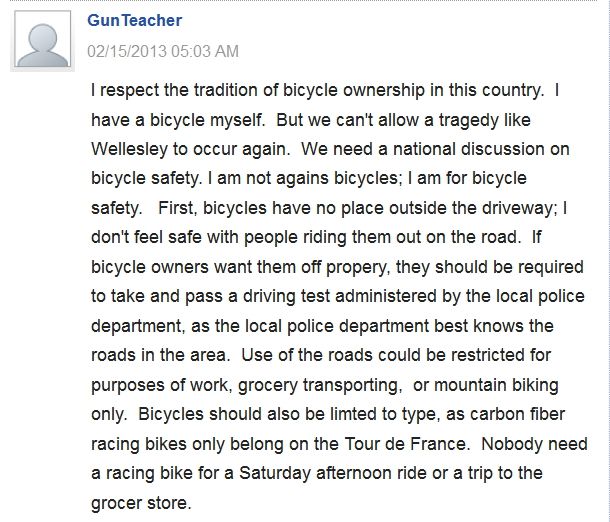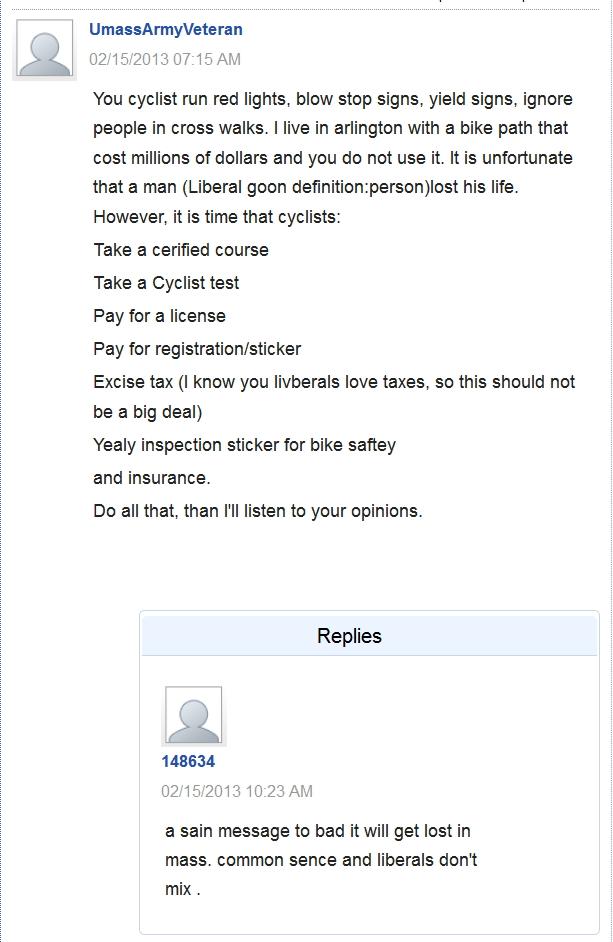Have we, as cyclists, made progress or have we lost ground? Law enforcement officials have begun to take cyclist injuries and deaths more seriously. Still, things are not as rosy as they might appear.
When cars strike bicycles, not all cases are ignored. Thanks to cyclists’ public outcry for justice, prosecutors have become more willing to consider pressing charges against negligent drivers who harm cyclists.
A case in point: I, like many other cyclists, wrote about the grand jury that failed to indict a truck driver for killing a cyclist in Wellesley, Massachusetts. A video of the truck trying to pass the cyclist, who was riding in front of him, shows the sequence of events as they unfolded. Eyewitness testimonies also told a story of a truck driver who failed to take proper steps to safely pass on a road which he knew — from prior trips along it — narrowed considerably at that point.
Several days after I wrote the post about the grand jury, Boston.com published an article about the outcry from cyclists about the grand jury’s decision not to indict the truck driver.
This outcry was represented by the author in the form of comments from one bicycle advocate and one bicycle accident lawyer. While both of these people are cyclists and supporters of cyclist rights, it would have been nice to include the opinions of a few everyday cyclists to balance out the mix.
As one might expect, a huge number of comments were left on the article — 567, to be precise. If I had the time and patience, I would scroll through all of the comments. But they were too repetitive and it seemed too much of a chore to hunt for anything original in the vast sea of garbage.
Towards the beginning of the comments, I noticed something written by a commenter who went by the name of “GunTeacher.” Names like that always signal bad news. His/her comment sounded like a combination of gun ownership advocacy and anti-bicycle sentiment. It’s nothing new to cyclists, but worth skimming as an example of how much some drivers want restrictions placed on cyclists.

The next comment which caught my attention was written by an anti-bicycle conservative. It’s strange how Boston.com has been overridden by liberal-hating conservatives. At one time, a more progressive group commented on this site.
Anyone reading Boston.com today would regard Massachusetts as a very right wing state. And further they might conclude that cyclist-haters were predominantly conservatives, a group known for promoting elitism and fewer rights for groups they consider unworthy. His comment is as follows:

It was worth including the reply to “UMassArmyVeteran” because his counterpart’s clear illiteracy may explain the lowbrow behavior of anti-cyclist drivers.
Reading on, I suddenly became acutely aware of two things: the absence of pro-cyclist comments and how the majority of the comments focused on bad cyclist behavior, not the death of the cyclist or actions of the grand jury.
Maybe if I had read more of the comments, I would have found a few opinions on the lack of an indictment in a case where there was abundant evidence of negligent driving. But, all the cyclist bashing and lack of sympathy for the deceased cyclist turned me off to reading more. An example of some of the more distasteful comments was left by someone with the antiquated sounding nickname of “salspal.”

As ignorant as this person is, he/she perfectly portrays the mindset of the general public towards cyclists. They have no sympathy for the cyclist for one of a myriad of reasons they give for why the cyclist “had it coming.” In other words, they blame the cyclist for his own death by arguing that as a member of a group who is perceived as reckless, arrogant, law breaking, and stupid (for riding on the road with cars), he deserved what he got.
Essentially, the anti-cyclists who dominated this comment section were promoting the idea that death is a fair penalty for disobeying traffic laws and/or inconveniencing drivers. Grand juries are made up of people, at least in part, who share these views.
In refusing to indict the truck driver in this incident, the grand jury sent the message that murder is an acceptable response to annoyance caused by cyclists. Further, they sent the message that disapproval of bad cyclist behavior, which is attributed to all cyclists irrespective of individual views or conduct, justifies the killing of a cyclist.
Increased investigation into car-bicycle crashes is a step forward. Articles published on an otherwise anti-cyclist news site about the outrage of cyclists about the grand jury’s biased decision is also a step forward since in the past there was virtually no coverage of such events.
But as I’ve said before, grand juries are made up of a group of our peers. They are lay people, with no legal training and no instruction in the law. Their decisions come from personal beliefs and biases. This is not justice; it is a step in the wrong direction.
Legal decisions should be made using a legal process, one that is founded in the law. While the use of grand juries may be legal, their actions are both above and immune to the law.
Until societal attitudes about cycling are changed, justice will be beyond the grasp of cyclists. Hatred and prejudice will make a mockery of their lives and their deaths.
How this can be changed is unknown. You can’t make people like something they resent. But when that which is resented is a human life, you can protect it with the full weight of the law. Doing so is the mark of a civilized society, one which recognizes the need for legal reform to reflect changes brought about by an evolving culture. Cyclists will have to look in this direction for hope, recognition, respect and fairness.


